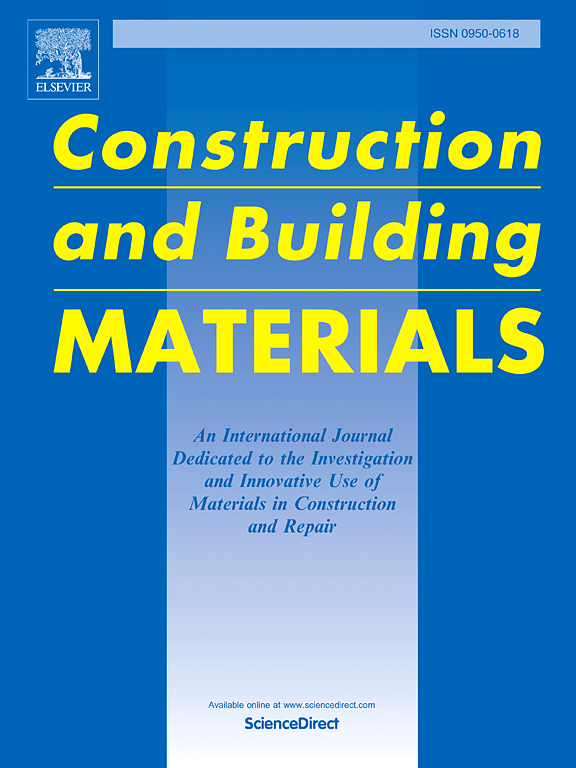Review on the effect of sewage sludge ash on the properties of concrete
IF 7.4
1区 工程技术
Q1 CONSTRUCTION & BUILDING TECHNOLOGY
引用次数: 0
Abstract
Sewage sludge disposal is a complicated task which requires considerable planning and investment. Unsafe disposal of sludge has the potential to pollute underwater sources due to the leaching of hazardous heavy metals and pathogens. The potential of recycling of sewage sludge as a construction material can help alleviate the problems associated with sewage sludge disposal and prevent environmental degradation. The present study aims to provide an assessment of the effect of sewage sludge ash on the properties of concrete as a partial replacement of cement and sand in concrete. The effectiveness of the pozzolanic activity of the sewage sludge ash is found to be dependent on the incineration process. The sewage sludge ash delays the setting time and reduces the early strength of concrete due to low pozzolanic activity, however, application of certain treatments and the use of accelerators can mitigate this effect. As observed in various studies, sewage sludge ash content of 5–10 % in concrete provides better compressive strength and comparable splitting tensile and flexural strength performance. It is also suggested that sewage sludge ash-based concrete provides improved durability performance, including reduced water permeation, improved freeze-thaw resistance and better chloride resistance. Based on the findings, it is suggested that sewage sludge ash in concrete offers satisfactory performance with the potential to reduce the environmental impact by lowering cement content. Sewage sludge ash usage in concrete can also tackle the issue of sludge disposal. However, safety validation through leaching tests is required before its application in concrete manufacturing.
污水污泥灰对混凝土性能影响的综述
污水污泥处置是一项复杂的任务,需要大量的规划和投资。由于有害重金属和病原体的浸出,污泥的不安全处置有可能污染水下资源。回收利用污水污泥作为建筑材料的潜力有助于缓解与污水污泥处置相关的问题,防止环境退化。本研究旨在评估污水污泥灰作为混凝土中水泥和砂的部分替代品对混凝土性能的影响。研究发现,污水污泥灰的胶凝活性效果取决于焚烧过程。污水污泥灰因其较低的水胶合活性,会延缓混凝土的凝结时间并降低其早期强度,然而,采用某些处理方法和使用促进剂可减轻这种影响。根据多项研究的观察,混凝土中污水污泥灰的含量为 5-10%,可提供更好的抗压强度以及与之相当的劈裂拉伸和弯曲强度性能。研究还表明,以污水污泥灰为基础的混凝土具有更好的耐久性能,包括降低透水性、提高抗冻融性和抗氯性。根据研究结果,建议在混凝土中使用污水污泥灰,其性能令人满意,并有可能通过降低水泥含量来减少对环境的影响。在混凝土中使用污水污泥灰还可以解决污泥处置问题。不过,在将其应用于混凝土制造之前,需要通过浸出试验进行安全验证。
本文章由计算机程序翻译,如有差异,请以英文原文为准。
求助全文
约1分钟内获得全文
求助全文
来源期刊

Construction and Building Materials
工程技术-材料科学:综合
CiteScore
13.80
自引率
21.60%
发文量
3632
审稿时长
82 days
期刊介绍:
Construction and Building Materials offers an international platform for sharing innovative and original research and development in the realm of construction and building materials, along with their practical applications in new projects and repair practices. The journal publishes a diverse array of pioneering research and application papers, detailing laboratory investigations and, to a limited extent, numerical analyses or reports on full-scale projects. Multi-part papers are discouraged.
Additionally, Construction and Building Materials features comprehensive case studies and insightful review articles that contribute to new insights in the field. Our focus is on papers related to construction materials, excluding those on structural engineering, geotechnics, and unbound highway layers. Covered materials and technologies encompass cement, concrete reinforcement, bricks and mortars, additives, corrosion technology, ceramics, timber, steel, polymers, glass fibers, recycled materials, bamboo, rammed earth, non-conventional building materials, bituminous materials, and applications in railway materials.
 求助内容:
求助内容: 应助结果提醒方式:
应助结果提醒方式:


